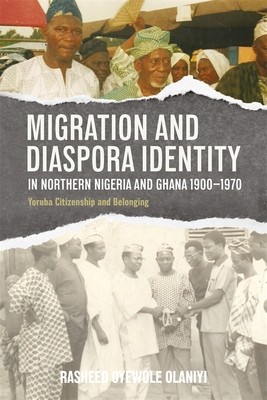
- We will send in 10–14 business days.
- Author: Rasheed Oyewole Olaniyi
- Publisher: James Currey
- ISBN-10: 1847014283
- ISBN-13: 9781847014283
- Format: 15.6 x 23.4 x 2.2 cm, kieti viršeliai
- Language: English
- SAVE -10% with code: EXTRA
Migration and Diaspora Identity in Northern Nigeria and Ghana, 1900-1970 (e-book) (used book) | bookbook.eu
Reviews
Description
At a time when the issues of internal and international migration have rarely been more present, this book brings an historic perspective to the complex and contradictory socio-economic forces and power relations at play in northern Ghana and Nigeria.
Regional migration is a recurring theme in West African history. It has led to the establishment of diaspora communities and social integration as well as exclusion. This book, based on fieldworks in northern Ghana and Nigeria, examines the experiences of Yoruba migrants in the diaspora and interactions with their hometowns as well as return migration and explores the importance of mediation through kinship linkages. Comparing Yoruba migration and diaspora identity in Tamale (Ghana) and Kano (Nigeria), the author shows how dual citizenship that was empowering in the colonial period became disempowering during postcolonialism. In this study, the post-modern adoption of diaspora identity as a social theory explains migration across colonial boundaries and how Yoruba communities living outside their cultural areas interacted with the homeland for development. Most pioneer migrants in the early 20th century left home in search of money, modernity, and freedom from patriarchal control.By the end of the Second World War, when migration had become popularized as early migrants became highly influential role models and successful figures, young men and women were pushed by their aspirations or families to migrate. As proto-bourgeoisie, some mixed African experiences with European ways. Early in their careers, they embraced modernity in the city, but they later moved to traditional life in rural areas or urban centres where they steered new waves of local development. Many of them completed the migration cycle, as they prepared for return and reintegration in their hometowns in south-west Nigeria. In Tamale, inter-group relations among the subject population were not rigidly enforced by the colonial state, allowing rapid integration of the Yoruba migrants and their acceptance as Ghanaians by the Dagomba host community. In Kano, by contrast, ethnic relations were regulated under the Native Authority system and segregation of the migrants in Sabongari. As a result, hierarchies of citizenship developed between the host community (natives) and migrants (non-natives), leading to tension, rivalry, mistrust, and conflicts among the people who laid claim to the same nationality.
EXTRA 10 % discount with code: EXTRA
The promotion ends in 22d.17:51:23
The discount code is valid when purchasing from 10 €. Discounts do not stack.
- Author: Rasheed Oyewole Olaniyi
- Publisher: James Currey
- ISBN-10: 1847014283
- ISBN-13: 9781847014283
- Format: 15.6 x 23.4 x 2.2 cm, kieti viršeliai
- Language: English English
At a time when the issues of internal and international migration have rarely been more present, this book brings an historic perspective to the complex and contradictory socio-economic forces and power relations at play in northern Ghana and Nigeria.
Regional migration is a recurring theme in West African history. It has led to the establishment of diaspora communities and social integration as well as exclusion. This book, based on fieldworks in northern Ghana and Nigeria, examines the experiences of Yoruba migrants in the diaspora and interactions with their hometowns as well as return migration and explores the importance of mediation through kinship linkages. Comparing Yoruba migration and diaspora identity in Tamale (Ghana) and Kano (Nigeria), the author shows how dual citizenship that was empowering in the colonial period became disempowering during postcolonialism. In this study, the post-modern adoption of diaspora identity as a social theory explains migration across colonial boundaries and how Yoruba communities living outside their cultural areas interacted with the homeland for development. Most pioneer migrants in the early 20th century left home in search of money, modernity, and freedom from patriarchal control.By the end of the Second World War, when migration had become popularized as early migrants became highly influential role models and successful figures, young men and women were pushed by their aspirations or families to migrate. As proto-bourgeoisie, some mixed African experiences with European ways. Early in their careers, they embraced modernity in the city, but they later moved to traditional life in rural areas or urban centres where they steered new waves of local development. Many of them completed the migration cycle, as they prepared for return and reintegration in their hometowns in south-west Nigeria. In Tamale, inter-group relations among the subject population were not rigidly enforced by the colonial state, allowing rapid integration of the Yoruba migrants and their acceptance as Ghanaians by the Dagomba host community. In Kano, by contrast, ethnic relations were regulated under the Native Authority system and segregation of the migrants in Sabongari. As a result, hierarchies of citizenship developed between the host community (natives) and migrants (non-natives), leading to tension, rivalry, mistrust, and conflicts among the people who laid claim to the same nationality.


Reviews